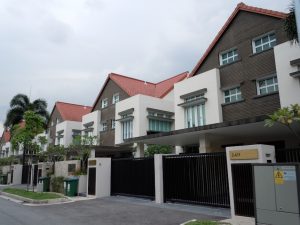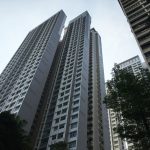Singapore’s real estate market finally showed some recovery in late 2017 with property prices increasing, after 15 quarters of continued decline in the Property Price Index. However, could the recovery warrant a cautious optimism or full steam ahead? And, to what extent will the recovery last?
A research report by RHB invest said that the rebound in property prices since 3Q17 is a positive sign that the doldrums in the property market has ended and that the property sentiment has also improved to a record high.
Table of Contents
“We believe the major trigger for this round’s recovery are rising en-bloc sales, exacerbated by owners re-entering the market as they seek alternative places to stay,” the report said.
The report however cautioned that a high number of supplies coming onwards – following a surge of en-bloc sales – are likely to dampen property prices over the next few years.
“This is because developers have to build, sell and complete en-bloc land projects within a 5-year period to avoid higher charges,” it noted.
 On the demand side, affordability has improved with the recent rebound in property prices, driven mainly by local buyers. However, low rental yields are likely to keep away property investors who are chasing for good returns.
On the demand side, affordability has improved with the recent rebound in property prices, driven mainly by local buyers. However, low rental yields are likely to keep away property investors who are chasing for good returns.
The report suggested that property prices are likely to grow by 5-10 per cent in 2018, with the pace of increase to slow in second half with the oncoming rise in supply. Property prices are also expected to reach a peak within the next few years. But liquidity from en-bloc, and replacement and pent-up demand, should allow the
property cycle to last for a few years.
RHB said that in its view, Singapore is likely to see prices increase up to 20 per cent more from the current value before tapering off.
The report noted that the recent recovery in prices has also led to an improvement in sentiment towards the property market, as shown by the National University of Singapore-Redas (NUSRedas) Real Estate Sentiment Index, which has improved to a reading of 6.9 from 6.6 in the third quarter of 2017. A reading of above the 5-unit threshold implies improving market conditions.
RHB suggested that the tighter supply was one major reason supporting upward prices. It noted that units of unsold and newly-launched properties have been declining steadily since late 2011 and reached a record low of 8,263 units in 3Q17 – the lowest number recorded since data was introduced in 1995. The rather narrow buffer of available units is equivalent of one-third of available supply for the quarter, as 19,000 units were sold in 3Q17.
It further noted that units planned and under construction are also declining. The number of private residential units – which includes planned units and those under construction – has been declining steadily from its peak high in 4Q12. It reached bottom in 3Q17 at 43,054 units, before rebounding recently.
“Tightening supply supported by en-bloc sales. Owners who managed to sell their property under an en-bloc scenario are likely to re-enter the market to look for a new place to stay within the vicinity. We think this is the likely reason that supported prices towards 2017. We believe the trigger for prices recovery is somewhat supported by this spiral effect.”
The improving job market and low interest rate environment have aided the demand for property, the report said.
“With the labour market tightening, wage pressures have started to build up. Meanwhile, Singapore’s housing loan rate (calculated by the average of 10 finance companies) is among the lowest on record. Price-to-income ratio has improved. As a good parameter to judge the current affordability of homes, the price-to-income ratio has shown positive development since late 2010. This particularly reflects the continued improvement of household income, which has grown by a CAGR of 4% over the last 10 years. By comparison, the median property price has grown by a CAGR of 1.2% over the same time period.”
https://www.icompareloan.com/best-home-loans-singapore/
RHB said that the government’s various pre-emptive measures to reduce demand and speculative behaviour – such as the Total Debt Servicing Ratio (TDSR), Seller’s Stamp Duty and Additional Buyer’s Stamp Duty – are still in place. And that these measures have been successful in curbing the influx of overseas money.
This means that demand from Singaporean buyers remains the primary driver of the private residential market’s recovery. The proportion of domestic purchases increased to 75% in 2017 from 64% in 2011.
“There is room for price increase given the affordability. As demand recovers, there is scope for developers to raise prices before they become unaffordable. Even by international standards, Singapore’s price-to-income ratio is more favourable to the likes of big cities such as London, Tokyo and Hong Kong.”
RHB Invest noted that property cycles closely follow the movements of the business cycle, which – in turn – reflect not only the supply and demand, but also sentiment and government measures.
https://www.icompareloan.com/resources/real-estate-market-sentiment-high/
“In the last 30 years, four property cycles have occurred, which had been driven by the business cycle, government measures, or a combination of both. Past cycles lasted between 2-4 years. The most recent past recovery cycle started in 2009 after the Global Financial Crisis (GFC) and peaked in 2013, interrupted by the effects of the cooling measures – this included the TDSR. Another peak and bust period was in 2004-2008, where the economy was hit by onset of the GFC. Each of these recovery cycles lasted about 2-4 years and ended due to market or regulatory events.
Pace of recovery depends on several factors, namely the inventory cycles, monetary policies, or sentiment. But the recent rebound seems likely to be sustainable, given several years of pent-up consumer demand. Developers have also been active in buying land, which – in turn – has pushed up land auction prices for residential sites significantly through 2017.”
If you are home hunting, are concerned about the escalating property prices and want a bang for the buck, our Panel of Property agents and the mortgage consultants at icompareloan.com can help you with affordability assessment and with best home loans. The services of our mortgage loan experts are free. Our analysis will give best home loan seekers better ease of mind on interest rate volatility and repayments.
Just email our chief mortgage consultant, Paul Ho, with your name, email and phone number at paul@icompareloan.com for a free assessment.






